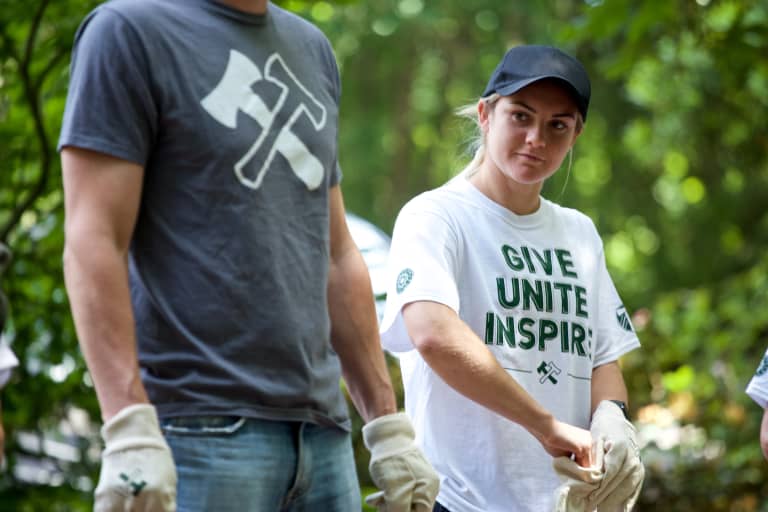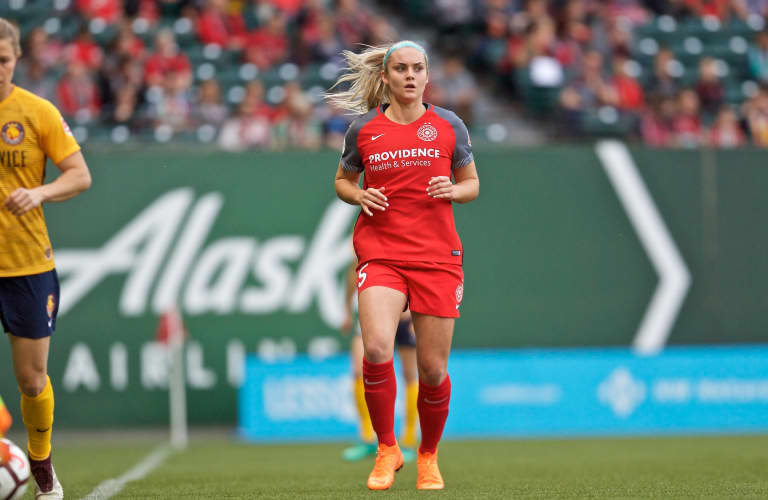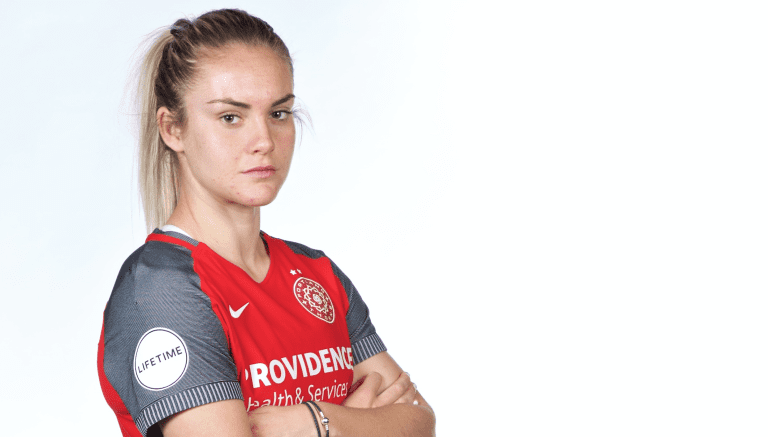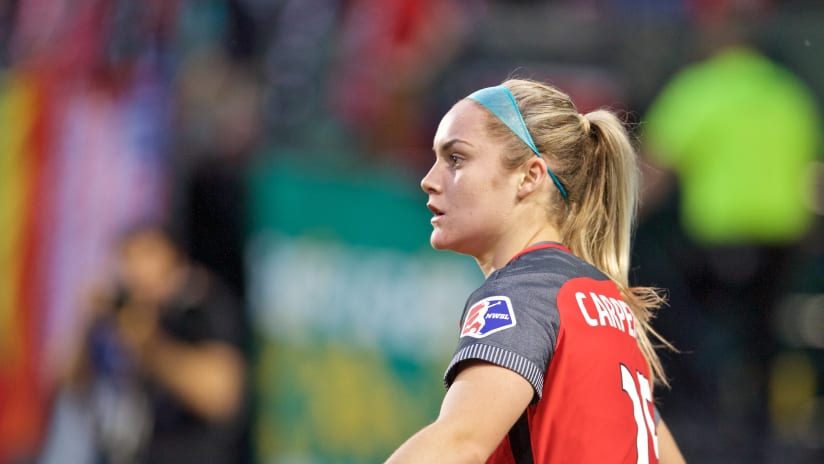Eighteen-year-old phenoms are supposed to be gifted. They're not supposed to be products of hard work.
Their skills are supposed to be natural, the result of a genetic lottery that we missed out on, one where they just happened to draw the right numbers. When you're that young, there hasn't been enough time for hard work, let alone have that work paid off.
Try selling that to Ellie Carpenter. Two-and-a-half months ago, Carpenter moved across the world to pursue her profession, one she's been dedicating her life to since she was 12 years old. That's when she left her hometown, moved to Australia's largest city, and put herself on professional soccer's course. For six years, everything in her life has been dedicated toward a singular goal.
Now, having already appeared in an Olympics and carved out a regular place in her country's national team, she is in Portland, over 7,600 miles from home, having won a place with one of the world's most famous women's clubs. But for anybody who's just seeing her play with Portland Thorns FC, it would be a mistake to think Carpenter's here on natural talent alone. The sacrifices she's made along the way have paved her path to Portland.
"You have a goal, and you have to make sacrifices to reach that goal, and you have to give a lot of hard work," Carpenter says, reciting the values in a centered way that make them seem like mantra.
"You have to make a lot of sacrifices if you want to be at the top."

Sacrifice No. 1: Goodbye, Cowra
The tattoo on her ankle means she'll always be part Cowra, but as Carpenter approached her teenage years, it was clear she was outgrowing her hometown. Two schools, two traffic lights and 8,000 people, the small town sits away from Australia's east coast, edging toward the overlooked middle of the continent.
"It’s about four and a half hour drive west of Sydney, inland," Carpenter explains, describing a place that could only offer so many opportunities. A sports-crazed nation like Australia ensures even the smallest towns have fields and facilities to develop the next generation of talent. Who knows where the rugby, cricket, Aussie rules stars of the future will be found. But it can't provide the competition. And having trained with boys while constantly playing above her age group, Carpenter needed more.
Her brother Jeremy needed to go, too. Two years older than Ellie, his path would see him go to Japan and then Portugal to pursue his soccer. He knows four languages, now, according to his mother, but back in Cowra, he was in the same situation as his sister. Both were exceptional athletes. Both were outgrowing their hometown.
"We had a few family discussions," Carpenter recalled, "and I knew it was the best for me, to move to Sydney to pursue my dream."
But the first sacrifice Carpenter had to make wasn't hers, alone. Her mother would leave her life in Cowra, move to Sydney – a city of over four million people – to help raise her children. Her father would stay back, in the life they had before, and help support the family from there. Each member of the Carpenter family lost part of their lives to help Ellie and Jeremy grow.
"Making that decision quite young – I was only 12, and I didn’t really know what I was stepping into: leaving my school, my friends, my family, my house," she remembers. "Leaving Dad was hard. Mom sacrificed a lot – left her job, and stuff – to support me and my brother in Sydney, which was very nice of her to help us follow our dreams. It was a big move."
The benefits were obvious. The environment. The exposure. The access. There was a greater likelihood that the Carpenters would get incorporated into the national team setups if they moved, and over the next three years of her life, Ellie would enjoy a steep rise up the Australian ranks, eventually playing for the senior team as a 15-year-old. It's hard to imagine that happening if the family had stayed in Cowra.
"My aim was to move to Sydney and get identified," she says, bluntly, with no intent of sugarcoating the ambitions of her 12-year-old self. "I knew it was going to be a whole different pool in Sydney, with so many more people, and that was a new challenge, for me, to be the best in a big city.
"Going there, my first two years there, I went to a great sports school, and that helped me develop a lot as a person and as a player, and helped me get into the youth Australian teams: so the under-17s, when I was only 14. That gave me a really big step in where I wanted to go. Then, gradually, the 17s, the 20s, the national team when I was 15. It kind of all happened within the space of a year, or so – the craziest year of my life! I went from being 15, in school, in year eight, then year nine going to the Olympic games, which was crazy."
"I knew that I had to move to get the quality coaching in Sydney, to follow my dreams if I was serious about soccer," she recalls. "I knew that I had to make a move this young to get the training to able to be where I am today."
Six years later, Carpenter ties her identity to her hometown. The fight she shows against the Kealia Ohais, Megan Rapinoes and Christen Presses of the world was born there, combining the small town ethos with the compulsion to claw her way out.
"I think I'll always be that country girl. We’re made tougher out there. It bit harder. Just that never give up attitude ...
"Cowra is definitely a big part of where I came from. It kind of made me as a person."

Sacrifice No. 2: The life of a teenager
When Carpenter arrived in Sydney, she did so without any friends on the ground. The only social life she had was through her brother and mother, nothing a 12-year-old would be excited about. In deciding to leave Cowra behind, she also left almost every personal connection. A new life in soccer meant a new life, overall.
Consider what you were doing as a 12-year-old, and how much of that involved your friends. Having that taken away against your will would be traumatic, but to play in active part in that detachment requires some characteristics few adolescents have. It requires foresight, an acceptance of consequences, and a level of dedication that transcends that a formative stage. It requires sacrifice.
"I’m that person that can make a friend with anyone," she says, now, but when you're 12, you have no idea what you're going to be good at. And when you're 18, on the other side of your trials, the sacrifices don't seem so sharp. Carpenter knew she wanted to be good at soccer. Rebuilding friendships, though? It was a risk she had to take.
So when most other teenagers were socializing, Carpenter was working. At 15, when others might be taking vacations with their families, she was representing that national team in Brazil, at the 2016 Summer Olympics. She signed her first W-League contract that same year, and began fully competing with professionals. A year later, she was touring the United States with the Matildas, participating in the Tournament of Nations, and now, she's in the middle of a playoff chase with the Portland Thorns, all while others her age would be considering their life's course.
"Especially being my age, it’s very hard to get to the top," she says, trying to explain the choices of her teenage self. "And I think it’s even harder to stay at the top."
Carpenter counts fellow Matilda Chloe Logarzo among her closest friends in soccer, now. A midfielder for Australia, Logarzo, 23, has been the closest in age to Carpenter in Australia's teams. She also hosted her younger teammate in Norway, over a year ago, when Carpenter trained briefly with Adrianna Franch's former club, Avaldsnes. Though a life in soccer has cost Carpenter some of a teen's normalcy, normal does not necessarily mean irreplaceable.
"I really enjoyed the experience, there, and got a taste of what it’s like to play overseas, professionally," she remembers. Living away from home and bonding with professional players, her time with Logarzo showed her what life would be like after she turned 18 and was eligible to sign her first deal abroad.
"That was really good for me, to see what it’s like and to get me ready for this year."
Tournaments across the world. Vacations in Norway. Time away from most normal teen's pursuits. This was the bargain Ellie and Jeremy signed up for when their family set out on this course. And, as Carpenter notes, those choices have brought rewards to both.
But it's also required each leave part of their expectations behind. The relationships from Cowra. The typical, foundational friendships of a teenage world. Just as she's had to leave her homes behind, Carpenter has had to forsake much that we, as teenagers, cherished most.

Sacrifice No. 3: A world apart
Those lessons from Cowra and Sydney, though, made the move to Portland easier, even if it wasn't always clear the Rose City would be her first stop away from home. Teams in Europe had already expressed interest in signing her, and while she was in the States last summer, participating in the Tournament of Nations, other NWSL clubs were reaching out, too.
"I got a few offers from other clubs in Europe, and I think after the Tournament of Nations here, last year, when Portland reached out to me, I was considering the NWSL more than I was before," she said. "Just seeing the league and how it’s such a strong league, all around. I came to the fact that it would good for my first couple of professional seasons to be out here, to get that experience, to play in such a high-quality league.
"It lines up really well with our W-League, so pretty much all our national team players play in America ... I’d obviously heard that Portland was an amazing club. To get an offer from Portland was amazing. I had to take the opportunity."
It's the first time she's lived this far from her family, first time she's been living on her own, but even though she's in a country and culture she's never experienced before, the memories of her first move help to flatten her learning curve.
"I kind of like it (in Portland). It’s kind of quiet, like a small, cute little city," she says, referencing the grandiosity she left behind in Sydney. "I think it’s easy to get around, the people are nice, the coffee is good and the food is good. So I’m really enjoying it. I love it."
On the field, Carpenter has fit in quickly, too. Though her initial month was dominated by a process that got her used to her new teammates, coaching staff and club, Carpenter has now appeared in every Thorns game since May 9. Over that 10-game span, she's started seven times, scoring her first NWSL goal to win the Thorns' game in Washington, 1-0, on May 19.
From right wing to right back, Carpenter has played multiple roles. She's had to exert pressure high as well as defend the flank against U.S.-international caliber players like Ohai, Rapinoe and Press. She has started each of the team's past five games, playing all but two minutes in the process and, despite Portland's improving health, has put herself in the picture for a regular starting spot.
Still, that early success plays into a paradox that has left Carpenter's rise underappreciated. To look at her is to see somebody physically capable of competing with people five, ten years older. Even in the way she talks – as somebody who has already had to answer every question about life's decisions – she comes across as a veteran, so much so that you never consider how much has gone into accelerating her growth.
Nobody shows up at an Olympics or Tournament of Nations at 18 years old and just physically competes with the world's best. Same for the environment in the NWSL, and around the Portland Thorns. Perhaps there are subconscious elements to soccer that can't be taught – a feel or vision in some players that is best described as instinctual – but to show up in Portland and be able to physically match players like Christine Sinclair, Lindsey Horan, Ana Crnogorcevic or Emily Sonnett?
That doesn't happen overnight. That reflects years of work. Six years, in fact. At least. And while it's easy to believe somebody so young, so gifted has been naturally granted so much, that view also undersells what Carpenter has done.
"When I first made my name in the football world," she remembers, "everybody was like, 'Oh, where did she come from? She came out of nowhere.' But, really, no one’s really saying what’s got me where I’ve been today. It’s like, 'Oh, she’s just become so good,' but no. It’s the past 10, 12 years that’s made me what I am today."
In time, the narrative around Ellie Carpenter will change. Time is persistent, and you can only be the youngest on the field for so long. But by the time her chronology catches up to the rest of the world, Carpenter will have worked herself into something that transcends what she is now. And if her history of sacrifice is any indication, Carpenter is willing to give her all in search of her best soccer self.














